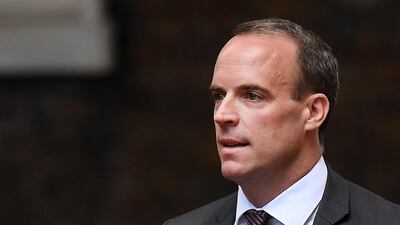An exit deal between Britain and the European Union is within sight, Brexit minister Dominic Raab told Parliament on Tuesday, as lawmakers from all sides told him the current negotiating plan had little hope of winning their approval.
Britain is due to leave the EU on March 29 next year, but has yet to secure an agreement to define future relations with Brussels and manage the economic impact of ending over four decades of integration with the world’s largest trading bloc.
Brussels has dismissed critical elements of Prime Minister Theresa May’s Brexit strategy, formulated in July at her Chequers country retreat, and it has been widely criticised by both those who want a more radical break from the EU and those who want even closer ties.
_______________
Read more:
Boris Johnson vents spleen over UK Brexit plan
UK PM rejects campaign for new Brexit vote
_______________
Nevertheless, Mr Raab was upbeat when delivering a summary of progress in the negotiations to parliament on its first day back after the summer break.
“We have made significant progress, we are making significant progress every week ... and a deal is within our sights,” he said.
But other lawmakers were less positive, indicating that Mrs May’s minority government will struggle to find support for whatever deal it strikes with Brussels. Mrs May must win parliamentary approval on a deal or risk leaving the EU without any formal agreement.
“Chequers is a dead as a dodo. The Secretary of State [Mr Raab] knows that and so does everyone else in this House,” said Tom Brake, an MP from the Europhile Liberal Democrat party.
Mr Raab said he disagreed, describing the negotiations as “positive”.
Earlier, Mrs May’s spokesman said Britain had to step up efforts to get a deal, describing talks as at a “crucial and intense phase”.
Nevertheless, with an October deadline for a deal expected to slip into November and little sign of breakthrough on fundamental disagreements with the EU, financial markets remain nervous about the possibility of Britain leaving without a deal.
A senior official at the Brexit ministry said he was confident that plans were in place for the possibility of a no-deal exit. Mr Raab said that while "no deal" was not what the government wanted, there would be some “countervailing opportunities”.
But the main opposition Labour party’s Brexit policy chief Keir Starmer said Mr Raab had failed to reassure anyone, and that Mrs May’s Brexit negotiating strategy would not survive intact.
Meanwhile, one of Britain’s biggest trade unions on Tuesday joined calls for a new public vote on leaving the European Union, saying voters were misled during the 2016 referendum campaign.
The GMB union, which has more than 600,000 members and is one of the Labour party’s key backers, said “the promises that were made during the referendum campaign are simply not the reality we are facing”.
In a video statement, general secretary Tim Roache says the union’s members in manufacturing, retail and other sectors face uncertainty because the British government has yet to negotiate a deal with the EU.
The union says Britons voted to leave the EU, but they “did not vote for economic chaos or to put jobs and hard-won rights on the line”, and voters should be able to accept or reject the final Brexit deal.

